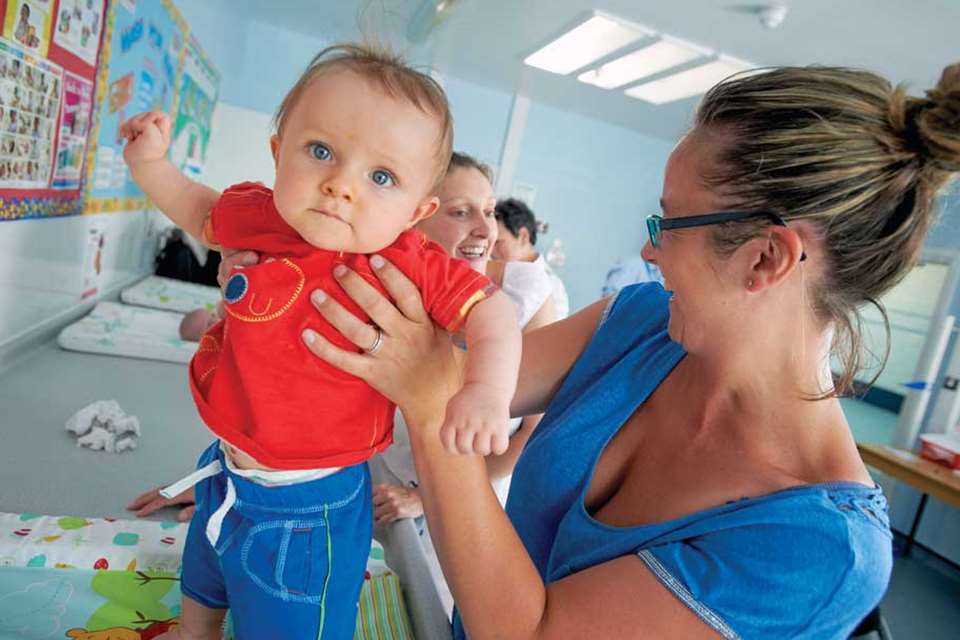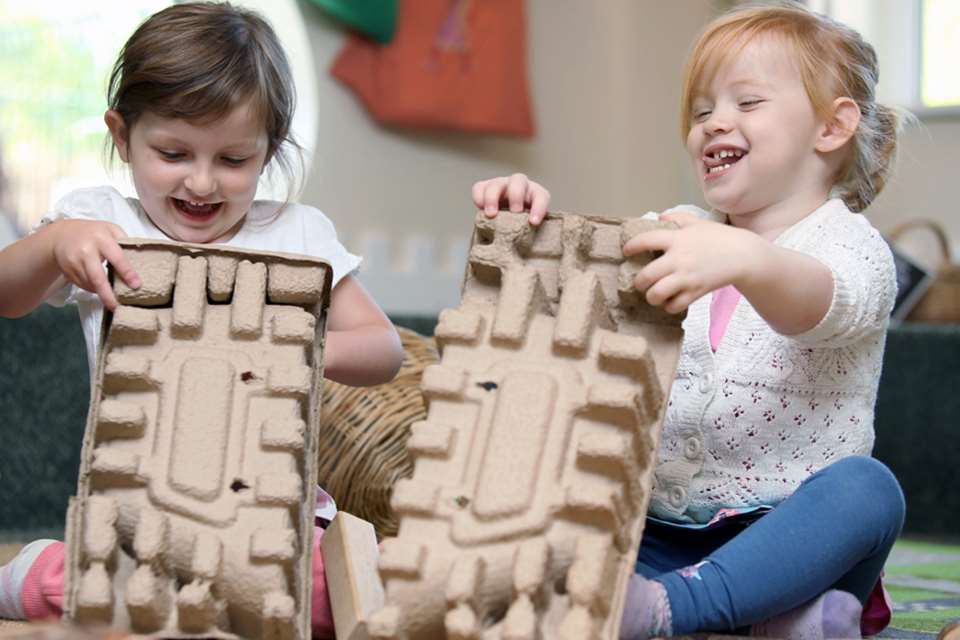A Unique Child: Integrated Review - Key to success
Dr Kay Mathieson
Monday, November 2, 2015
As one of the professionals closest to a child, with a responsibility for building a strong relationship with parents, the key person is crucial to an effective integrated review. Dr Kay Mathieson explains

A child’s key person is their most important link between home and setting; the responsibilities in this role are emotional as well as practical. The integrated review is an important event in our communication with parents – it must not stand alone, but build on positive day-to-day interactions with the key person.
The Statutory Framework for the Early Years Foundation Stage (EYFS) (DfE, 2014) is clear that: ‘Each child must be assigned a key person. Their role is to help ensure that every child’s care is tailored to meet their individual needs, to help the child become familiar with the setting, offer a settled relationship for the child and build a relationship with their parents’ (p21) and ‘The key person must seek to engage and support parents and/or carers in guiding their child’s development at home. They should also help families engage with more specialist support if appropriate’ (p10).
Given these responsibilities, the key person will be central to setting the tone of the relationship with parents. While the relationships with parents of ‘key children’ are likely to be closer and more in-depth, obviou-sly there is also a responsibility to cultivate equally positive relationships with all parents and carers involved in the setting community.
The Progress Check at Age Two has been part of EYFS requirements since 2012, requiring practitioners to review each child’s progress, identifying strengths and areas where progress is less than expected, including any significant concerns (DfE, 2014:13). The discussion with parents and carers must include the child’s learning that can be supported at home as well as in the setting.
Local authorities are now working to bring together the progress check and healthy child review, carried out by health visitors, to facilitate an ‘integrated review’ as an opportunity to ensure that any concerns about a child’s progress have been recognised and supported appropriately.
The principles are that the integrated review should:
- engage parents, particularly those who are disadvantaged
- engage the child, where they are participating
- be a process of shared decision-making.
By ensuring that care is responsive to a child’s individual needs, day-to-day conversations share understanding of child development, and parents/carers collaborate in decision-making, the key person is also creating a positive context for the integrated review. In essence, the principles of the integrated review give a blueprint for all our communication with parents and an opportunity to review our current confidence, competence and effective practice.
KEY PERSON ROLE
Effective relationships with parents and carers
As a key person, our first meeting with parents is the beginning of a long-term relationship. The first impression we make should convey that we are open-minded and genuinely interested in getting to know the child and their family.
Ongoing conversations are not just about ‘passing the time of day’ or ‘doing a handover’, but establishing a professional exchange and sharing of our own and parents’ specialist knowledge as it relates to the child. The balance between talk of concerns, celebrations, details of helping the child in the setting and ways of supporting at home builds coherence in the communication over time with parents/carers.
Coherent and consistent
The professional nature of the relationship with parents does not mean that all parents will be our best friends or vice versa, but does require us to maintain a focus on recognising and meeting the child’s needs.
Consistent and coherent communication with parents engages us in a shared journey of increasing understanding of the child’s developmental progress.
Predictable events such as transition to another room can be prepared for in a way that gives the child the ‘best possible chance of success’ because the adults understand the child’s perspective and anxieties.
Communicating with parents is not about saying everything is fine; concerns must be raised and explored as they arise, not waiting for more formal opportunities. The day-to-day conversations keep our shared understanding of a child realistic and grounded in evidence, including observations from home and setting.
Preparing for the review
As the integrated review approaches, conversations can focus on topics to be discussed. Local authorities will be using different formats for the review, which may also vary depending on the level of a child’s needs.
While leaders, managers and special educational needs co-ordinators may instigate the conversations about when and where the integra-ted reviews will take place, the key person is ideally placed to ensure that parents understand the local co-ordination between the setting and the local health visiting team.
As well as reviewing the child’s progress in preparation for the review, the key person should also consider the support available through the Local Offer as published on the local authority website, identifying anything that may be of interest to the parents or as support for the child.
Support for the key person
As you gain experience in the role of key person, the process of establishing and maintaining positive relationships with parents may become less daunting, but is always likely to include challenges.
The system of supervision in your setting will provide an important source of support. Supervision discussions provide opportunities to:
- discuss any issues – particularly concerning children’s development or well-being
- identify solutions to address any issues as they arise
- receive coaching to improve personal effectiveness.
Supervision is a two-way process – the supervisor and supervisee have a joint responsibility to contribute to the effectiveness of the discussion. Making good use of the opportunity is about working with your supervisor to explore and understand concerns rather than being told or insisting you know ‘the answer’.
Differences of opinion are inevitable and need to be worked through based on the evidence of observations, interactions and using hypotheses to help make sense of another’s perspective, whether adult or child.
The prompts and questions in the box on the left may be helpful in thinking about your current confidence levels, skills, knowledge and competencies related to the integra-ted review, or to inform future supervision discussions.
QUESTIONNAIRE: CONVERSATIONS WITH PARENTS
Confidence
How would you rate your confidence levels in discussing the following topics with the parents and carers of your key children?
Mark your performance on the scale: 1 2 3 4 5 6 7 8 9 10, with 1 = very anxious and 10 = confident.
Explaining local integrated review arrangements.
Sharing child development knowledge as it relates to each child.
Sharing concerns with the health visiting team about child’s progress (or lack of).
Diet and mealtimes.
Use of dummy affecting early language development.
Behaviour causing concern in the setting.
Behaviour causing concern at home.
Different behavioural expectations between home and setting.
Parental concern raised unexpectedly.
Child’s lack of progress in one of the Prime areas.
Reflection
For any ratings less than 5, assess and discuss with your supervisor what professional development opportunities (work shadowing, mentoring, coaching, courses etc) might help increase your confidence.
Current communication
To what extent do the following statements reflect your practice with the parents of your key children at present?
Judge each according to whether you: Agree, Agree sometimes or Disagree.
All my conversations support their confidence in understanding their child’s developmental progress.
I welcome every parent personally at the beginning of every session.
I use effective strategies to communicate positively with parents who speak a different language from me.
I agree with parents’ times and methods of communication that work best for them for different purposes (phone, text, email, letter, translation etc).
I use brief daily conversations with parents to highlight how their child’s progress can be supported at home.
I ensure daily conversations have coherence with regular longer discussion about progress.
I listen and respond supportively to parents’ concerns .
I follow up concerns to ensure my input has been helpful or to confirm if further action is needed.
I work with a more experienced colleague to prepare for specific conversations with parents.
I use supervision to reflect on and improve my relationships with parents.
Current engagement
To what extent do you engage with parents of your key children?
Assess your engagements by the following scale:
80 per cent
50 per cent
30 per cent
10 per cent
Less than 10 per cent.
What percentage of parents do you engage in conversation for at least three minutes three times per week?
What percentage of your conversations have explicit content about child development – something a child is doing now and what is coming next?
What percentage of your conversations do you feel are positive?
What percentage do you feel are challenging or uncomfortable?
Reflection
Which of the percentages do you feel you would like to improve first? What help or support would you like?
Coherence
How would parents currently describe the coherence between:
daily conversations with the key person
conversations with different staff members
regular longer conversations (weekly, fortnightly, monthly...)
written summaries or reports of progress
messages from setting practitioners and other professionals involved with the child
What evidence do you have of parents’ views?
MORE INFORMATION
Council for Disabled Children and 4Children SEN and Disability in the Early Years Toolkit, www.foundationyears.org.uk
Identifying Special Educational Needs in the Early Years by K Mathieson (2007), Paul Chapman, Sage Publishing
Inclusion in Early Years by C Nutbrown, C and P Clough (2006), Sage
Inclusion in the EYFS by K Mathieson (2015), Open University Press, McGraw-Hill Education
Person-Centred Planning information available from www.helensandersonassociates.co.uk
Special Educational Needs and Disability Code of Practice: 0-25 years, Department for Education and Department of Health (2014)
Statutory Framework for the Early Years Foundation Stage, Department of Education (2014)
[asset_library_tag 1009,Download the PDF]







